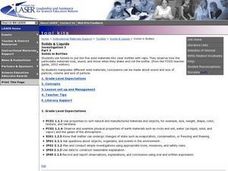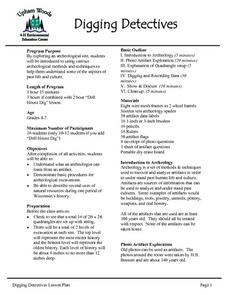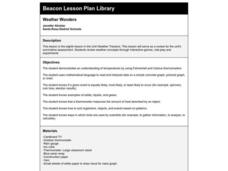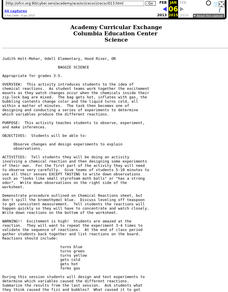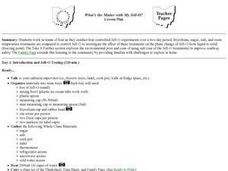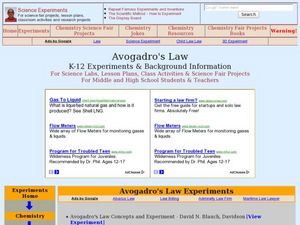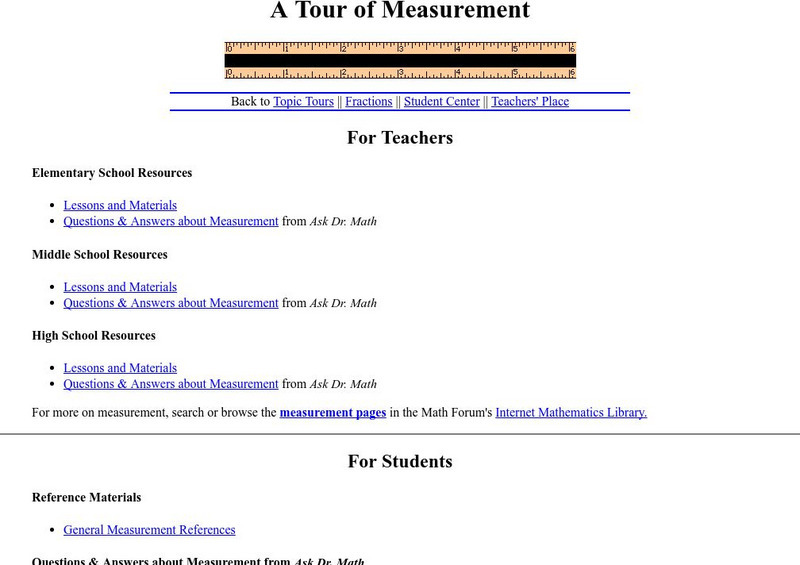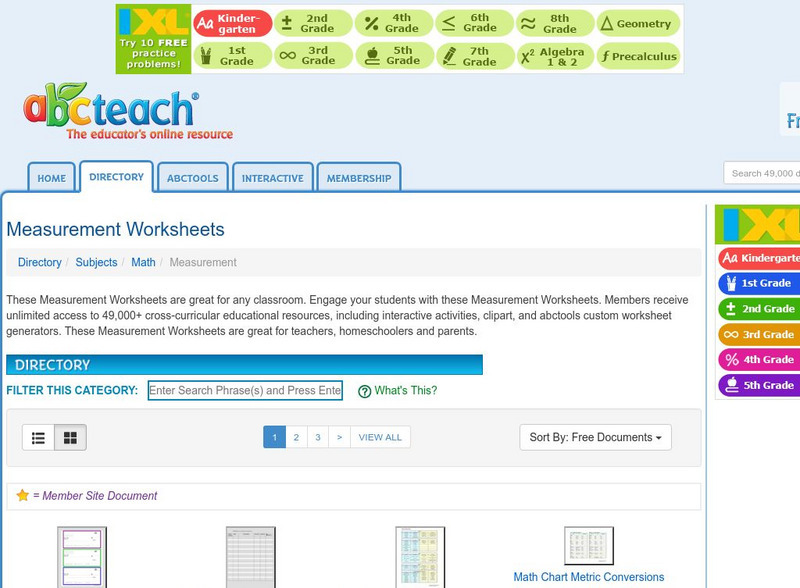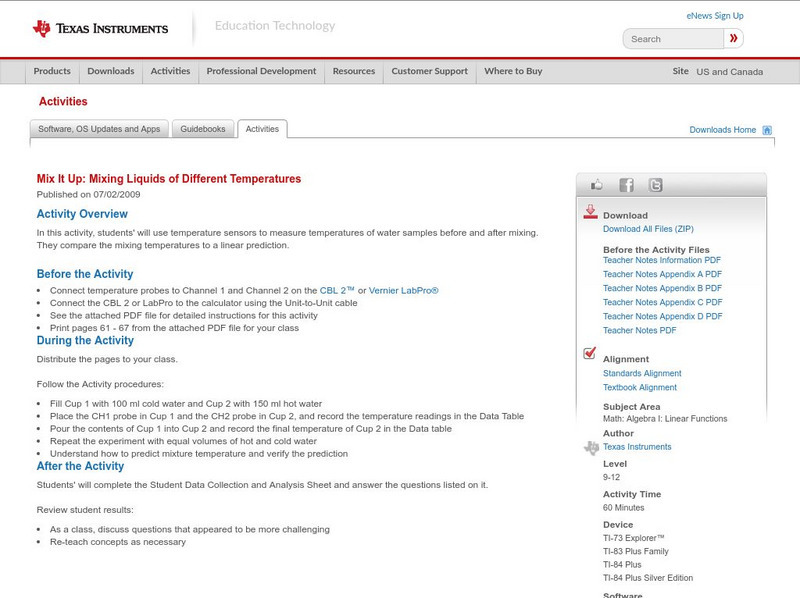Curated OER
Funny Putty
Students study that colloids are mixtures which display the properties of more than one of these states.
Curated OER
Water Quality Monitoring
Students comprehend the four parameters of water quality. They perform tests for salinity, dissolved oxygen, pH and clarity or turbidity. Students comprehend why scientists and environmental managers monitor water uality and aquatic...
Curated OER
Solids in Bottles
Students use funnels to put the five solid materials into clear bottles with caps. They observe how the particulate materials look, sound, and move when they shake and roll the bottle. Finally, students write "sound and touch" poetry.
Curated OER
Digging Detectives
Students demonstrate basic procedures for archeological excavations. They explore an archeological site, students using various archeological methods and techniques to determine some of the aspects of past life and culture.
Curated OER
Balloon Rocket
In this friction investigation learning exercise, learners follow the directions to construct a balloon rocket. Students use a string lubricated with soap and a drinking straw with a balloon. This is a page from the UK.
Curated OER
Drink It Up!
Students investigate how the human body needs water by recording their water consumption for a day. They sing a song about drinking water, make and drink Kool-Aid and eat apple slices, and conduct an experiment to determine how much...
Curated OER
Float or Sink?
Students examine why some objects float while others do not. They place various objects in water to observe their floating capability. Students record the object, its weight, and if the object floated. They construct a graph plotting...
Curated OER
Weather Vocabulary
In this weather worksheet, 3rd graders study words pertaining to all aspects of weather. Students respond to 19 questions, matching the vocabulary words on the left with the correct definition on the right.
Curated OER
Food Webs
Fourth graders discover how organisms depend upon each other in an ecosystem. In this ecosystems activity, 4th graders use food webs to discuss the interdependence between organisms in an ecosystem.
Curated OER
Taking In The Heat
Students discover that different textured materials can absorb more heat than others. Students work with thermometers, clocks, and graphs.
Curated OER
Baggie Science
Students work in groups and observe chemical reactions inside zip-lock bags. They use all of their senses, except taste, to observe the reactions.
Curated OER
Reading, Writing, And Math in Daily Living
Students, in groups, make chocolate chip cookies following a recipe.
Curated OER
Customary Capacity
Third graders convert customary units of capacity to make a gallon man out of construction paper. They use the computer to make a tree map of gallons, quarts, pints, and cups to show these conversions.
Curated OER
What's the Matter with My Jell-o?
Students work in teams of four as they conduct four controlled Jell-O experiments over a two-day period. The Family Page extends this learning to the community by providing families with challenges to explore at home.
Curated OER
Designing a Flotation Strategy for the Purification of Recycling
Twelfth graders work in teams to design a method of recycled plastics purification by flotation. They base their design on the concept that different kinds of plastics have different densities and keep overall costs and purification time...
Curated OER
Avogadro's Law
Students study Avogadro's law and what it means in science. In this gaseous lesson students complete an Avogadro's law experiment.
Science Education Resource Center at Carleton College
Serc: Measuring Liquid Volume
In this lab, young scholars will measure and combine colored liquids to receive the expected results. The intended outcome would be to take primary colored liquids, measure them and combine them to create a "rainbow" colored set of water...
PBS
Pbs: Standard Measures and Conversions: Liquid Volume, Milliliters and Liters
In this Cyberchase Media Gallery, explore key concepts about liquid volume, including standard units of liquid measure and how to convert between them. In the accompanying classroom activity, students create a complete conversion chart...
National Council of Teachers of Mathematics
The Math Forum: A Tour of Measurement
Peruse a collection of lesson plans, resources and FAQ's about measurement at every grade level.
abcteach
Abcteach: Math: Measurement
[Free Registration/Login Required] Teachers will find a variety of worksheets, booklets, conversion charts, warm-up activities and more on measurements. There is even one activity that could be used in a French language class which...
Texas Instruments
Texas Instruments: Mix It Up: Mixing Liquids of Different Temperatures
In this activity, students' will use temperature sensors to measure temperatures of water samples before and after mixing. They compare the mixing temperatures to a linear prediction.
PBS
Pbs Kids Afterschool Adventure!: Operation: Appetite for Fractions Activity Plan
In this week's Afterschool Adventure, Appetite for Fractions, children will explore fractions as they help create, divvy up, and serve a variety of real and virtual snacks.
Texas Instruments
Texas Instruments: Electrolytes: Which Liquid Produces the Most Volts?
In this activity, students' will use a Voltage Sensor to measure the voltage produced by an electrolyte. They will understand that acids and bases are electrolytes and compare voltages of acids to the voltages of bases. Students' will...




